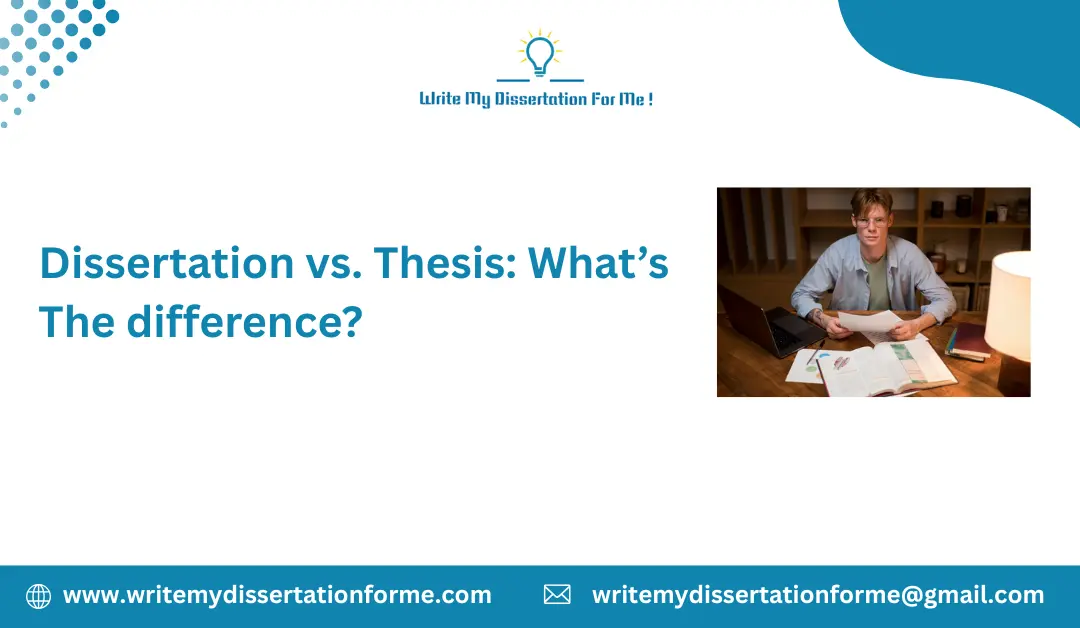Dissertation vs. Thesis: What’s the Difference?
August 12 2025 | 06 min read

A dissertation is a long piece of writing on a subject chosen by a student for final assessment in a PhD course. It is usually 30,000 to 70,000 words. A dissertation consists of an abstract, contents page, introduction, main body, case study, discussion, findings, conclusion, acknowledgements, bibliography and appendices. A thesis, on the other hand, is shorter in length and is used for assessing a master’s course.
Geographical location also determines how these terms are defined. In countries such as the United Kingdom, the usage is often flipped: the term dissertation refers to the final research project at the undergraduate or master’s level, while thesis denotes the doctoral research work. Having a tutor do your dissertation writing work ensures that you do not need to worry about specific institutional usage and requirements.
The tutor does it all for your ready reference. A good dissertation writing service, through its team of experienced writers, helps the novice researcher to accurately identify and answer their research questions. It also helps the client to make their research findings interesting and prepare their research to a robust scientific quality. A thesis is edited after its first draft is completed.
A dissertation tutor checks for language used and improvises on the clarity of ideas that the client wishes to convey through their arguments. The tutor, keeping in mind style conventions and British English language rules, improves the thesis’s readability by rephrasing sentences and changing translations, if applicable. A thesis is essentially a subset of a PhD dissertation, focusing on a broad overview of existing research, whereas the latter develops unique and original research that contributes to the existing body of literature. The first step to conducting research is choosing a frame of reference known as a paradigm. It is the hallmark of a good researcher to identify the often discreet paradigm and apply it to the research topic.
Compared to a thesis, a dissertation involves greater use of paradigms like functionalism and the use of an objective technique like surveying. A thesis has less use of subjective techniques like interviews and ethnographic studies since it relies more on secondary sources and has a completion time frame of around a year.
All scientific research involves observation wherein we observe natural or social phenomena, events and behaviour that interests us. We then make sense of observed phenomena and try to connect it to an epistemological framework through rationalisation for forming a theory. Lastly, we validate our theories through a scientific method of data collection and analysis. The steps differ on whether a deductive (general to specific) or inductive (specific to general) approach better suits a particular research topic. The contents page, as described earlier, lists all the phases of researc,h starting from the exploration phase involving identifying research questions.
Next comes the literature review, in which the researcher assesses the relevance and importance of the current body of knowledge, which can be presented in either a systematic or narrative format. It involves surveying existing knowledge systems in the area of inquiry, identifying key authors, theories, articles, and findings, and pinpointing lacunae in knowledge within that particular research.
A dissertation is made interesting by a researcher who clearly identifies whether the initial research questions have already been answered in the literature, if there are newer and interesting questions available and also if modifying the original research questions is necessary due to newer findings through the literature review.
The predominantly used paradigm of functionalist research involves testing theories and thus requires the researcher to proceed with the dissertation by identifying theories that could possibly address the stated research questions. Theory helps identify those aspects of the literature that are logically relevant to the research topic.
A dissertation is a very extensive endeavour, and it requires information to be arranged systematically chapter-wise. For example, a five-chapter dissertation would involve an introduction, review of literature, methodology, results or findings, along with interpretations, conclusions and recommendations.
Continuing with the dissertation requires the researcher to select an appropriate research design that encompasses activities to satisfactorily answer the research questions in the exploration phase. This involves choosing research methods and planning an appropriate strategy suited to the purpose. It is necessary to operationalise abstract theoretical constructs or, in other words, provide them with a quantifiable metric.
Simultaneously, the researcher must also decide on which research method to use. This can involve a quantitative, qualitative or even mixed approach depending on the complexity of the research at hand.
For e.g., an anthropological study of the Great Nicobarese tribe involves sociobiology, the systematic study of the biological basis of all social behaviour in all organisms, including humans. This being a multi-faceted social phenomenon, will require a thorough mix of both quantitative and qualitative approaches.
By the above discussion, it is clear that the scope and originality of the work differentiate a thesis from a dissertation. A thesis ranges between 40 to 100 pages and does not make a novel contribution to the academic community like a dissertation.
However, it is important in its own standing as the foundation for future publication and academic careers. The depth of each section in a dissertation varies significantly compared to a thesis. The literature review is expected to be far more exhaustive and must demonstrate mastery over a wide body of research. Dissertation writing involves knowledge creation by working independently, creatively and with persistence.
Students can advance in their academic journey by completing dissertations and publishing them in peer-reviewed journals. They can then present their work to a larger audience through regular conferences. A scholar’s identity is defined by their dissertation after a master's, while a thesis rarely leads to publication in its draft state unless later reworked. It naturally follows that a dissertation demands a longer time commitment due to its original and complex nature.
Choosing insufficiently motivated research questions that are biased towards individual interests and ignoring topics of academic relevance must be avoided as far as possible. This is because new knowledge or insight about the phenomenon under investigation will not be generated.
The research question must sufficiently convince others that the problem they seek to answer is real and not hypothetical. It should affect a sizable percentage of the population and must not have been covered in depth earlier. Another commonly noticed mistake is to pursue research fads or popular topics that have a limited shelf life.
For instance, studying the latest technology is counterproductive since it takes years to complete research and publish it. The latest trends may well be replaced by that time, and it is thus better to study topics that find a common thread across generations to prevent redundancy.
This also reflects on the researcher’s ingenuity and presence of mind. Novice researchers also tend to pursue problems that are either difficult to solve through available tools or are unsearchable altogether. It is only when there is a foreseeable scope to modify and fine-tune a problem in the future it should be taken up.
Furthermore, it is important to select research methods objectively and not simply follow a method that the researcher is most comfortable with. Lastly, it is important to first figure out the research method before beginning to collect data.
Otherwise, the data will likely be irrelevant and not suitable for the intended purpose, leading to a wastage of time and effort. Data collected must have qualitative rigour and not focus solely on quantity alone.
Any lack of planning and research design cannot be compensated for by blind data mining. For doctoral program admissions to the UK, availing dissertation writing help from a team of experts like those at writemydissertationforme.com ensures that you receive curated content from subject matter experts who understand the ins and outs of the admission process, having worked with several happy and satisfied clients.
Our experience translates to tangible results, and we leave no stone unturned to make sure that the thesis and dissertation written is uniquely tailored to each client. This avoids ambiguity and scope for error, giving our clients the best possible chance to catch the interest of the admissions committee and receive their approval for admission to the top universities.
The admissions committee that evaluates doctoral program applications maintain a rigorous standard. Spending time and effort in preparing one’s dissertation does not necessarily assure one’s success in today’s era of competition. Hence, allow us to be a cost-effective partner in your progress and help you achieve your dream school at the earliest!
If you loved reading this, please share this,
also read

How to Write a Great PhD Research Proposal
Writing a PhD proposal forms the basis for your entire doctoral journey. It is not merely a formality to be completed, but ra...

Can You Provide Tips On Writing Doctoral Dissertation Abstracts And Conclusions?
The process of writing a PhD dissertation is both difficult and rewarding. The abstract and conclusion, two of its most impor...

How Long Should a Dissertation Abstract Be? Tips for Staying Concise
A dissertation abstract is frequently the first portion readers see, making it an essential component of your academic work. ...